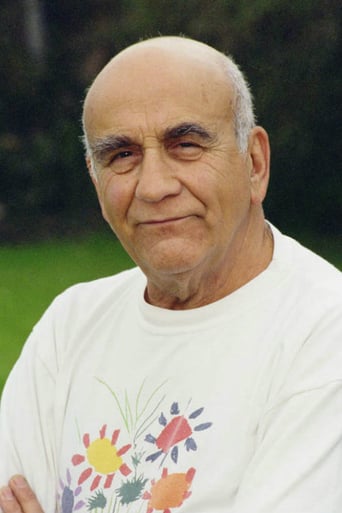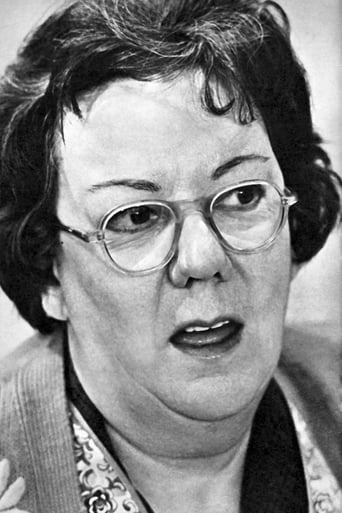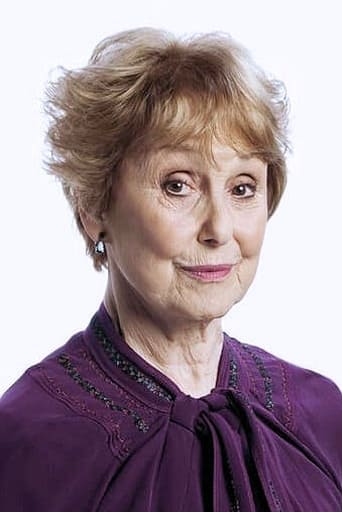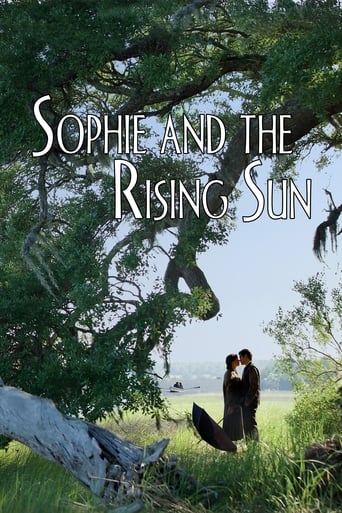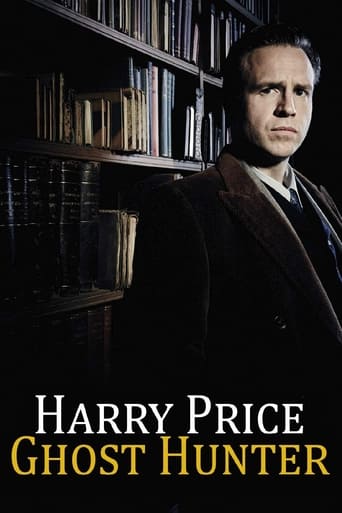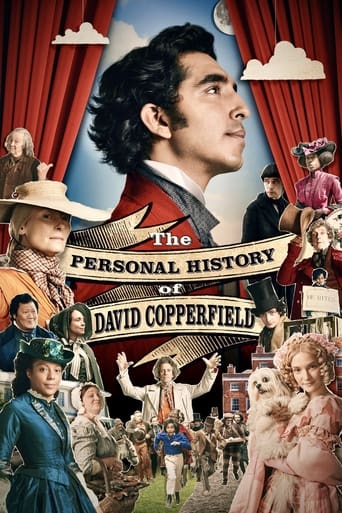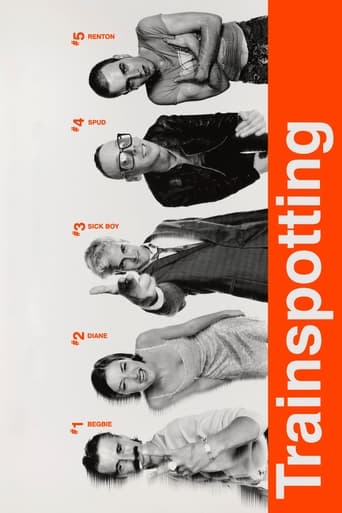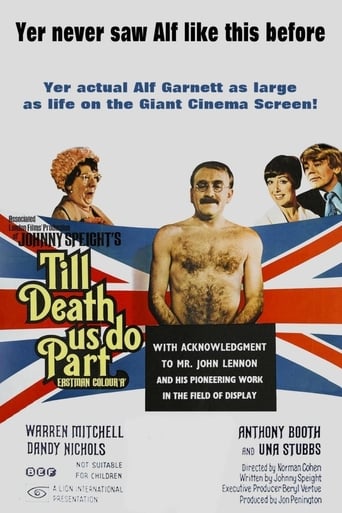

Till Death Us Do Part (1969)
The film version of 'Till Death Do Us Part' tells the story of Alf Garnett, his wife Else, and their newborn daughter Rita, living through the London Blitz and beyond.
Watch Trailer
Cast


Similar titles
Reviews
One-off movies based on TV sit-com series seldom work, which is probably the reason there aren't more of them. Generally they fall into the trap of expanding material that sits well in a half-hour slot but when stretched to feature length comes out as interminable even for the fans. "The Inbetweeners Movie" is a classic example of how not to do it. I must admit I approached the 1969 film of "Till Death do us Part" with some trepidation on this score only to finish up with more than a degree of pleasant surprise. Norman Cohen's Alf Garnett saga works well for the very reason it is just that - a saga spanning the second world war before hopping on twenty years. It crams in a tremendous amount, sometimes almost too much. A lengthy sequence in which Alf and his "Scouse git" son-in-law drunkenly attend Britain's World Cup victory seems just an excuse for including some archive newsreel footage. And then there are those monologues such as Alf's church prayer for salvation against being re-housed and his acceptance in a dream of an honour bestowed by "Her Gracious Majesty" that have a silliness bordering on the embarrassing. Not so two deliriously funny sequences, one where the old "moo" joins in a sing-song in a London underground shelter during the blitz, another a riotously drunken wedding celebration that has the energy one finds in the best of Fellini and Ford. Quite some achievement! But possibly the most memorable feature of "Till Death do us Part" is its re-creation of those dusty East End streets during the dark days of the war. In such scenes the film touches on the special.
No sooner had the television version of Johnny Speight's controversial B.B.C. sitcom ended - temporarily, as it turned out - than the cast reunited for this feature film spin-off. Interestingly, it sets itself up as a prequel, initially featuring Alf and Else in London's East End during the Forties. We see Alf here as an eccentric patriot, rather than the tyrant bigot he became. Over news reel footage of Nazi tanks he boasts that Hitler is too scared to go to war with Britain. But it happens, and suddenly he is terrified. He believes it won't last long though. His patriotism vanishes the day the call-up papers land on his doormat. The attention to period detail here is marvellous; rationing books, air-raid shelters, doom-filled radio broadcasts, they're all here. Much to his disgust, soldiers are tucking into bacon and eggs while he has to make do with spam. The pub runs out of beer, and Alf cannot fill his pipe with tobacco. Though he manages to stay out of the army by being in a reserved occupation, he has other problems to contend with - Else is pregnant. The second part takes us to 1966; mini-skirts are in fashion, and Alf comes into conflict with his trendy lefty daughter Rita and her 'Scouse git' boyfriend Mike Rawlins. Alf won't let her put 'Vote Labour' posters in his window. This section is not as good as the first, but it is nice to see the circumstances that brought the characters together. There is a hilarious scene at Rita's wedding reception when Alf gets into a fight with Mike's father, a devout Catholic. Amongst the cast is future 'On The Buses' stars Michael Robbins and Bob Grant ( even though the latter has no lines ). Norman Cohen must have liked working in the wartime period as he went on to direct the film version of 'Dad's Army' and 'Adolf Hitler My Part In His Downfall', based on Spike Milligan's memoirs. Bill Maynard plays 'Bert', Alf's next door neighbour, with whom he conducts conversations whilst on the toilet ( how well I remember outside bogs. Ugh! Cold! ). It is impossible not to feel sorry for Alf as he walks up the street where he has lived for years, now deserted. For many people, this was a reality. Hitler could not destroy the street, but the local council did. The movie ends where it began - in a cinema - with Alf standing as the National Anthem plays, everyone else having gone home.Released in America under the title 'Alf 'n Family' ( presumably to capitalise on the connection with 'All In The Family' ), it was so successful it opened the floodgates for other sitcom-based films such as 'On The Buses' and 'Dad's Army'. A sequel - 'The Alf Garnett Saga' - was made three years later, but it was not a patch on the first.
I first saw this film, when it was originally released in 1969 at the ABC Edgware (now, a block of flats and a gym, very much in line with the film's partial theme of community break-up), but was somewhat disappointed because it didn't contain the original music nor - until three-quarters into the film, the original format - Alf, Else, their daughter Una Stubbs and Tony Booth as her husband the "scouse git". Now, 37 years on, I think differently. Although somewhat episodic, it beautifully captures a bygone era, with excellent footage of London during WW2, a good feel of the old East End, plus old-fashioned pub culture without the plastic fittings and lager and the traditional family all eating around the table. There is the quaint working class Tory ethos embodied by Alf, not quite, the not for the likes of us of The Ragged Trousered Philanthropist, rather the loyal, home-owning, small-minded bigotry of someone who perceives himself as a self-made man, who has not made quite as much as he thinks he deserves.There are some lovely home-truths and vignettes within this setting: the £1,500 paid for the house (not a bad price in this day and age!), the mortgage from the Council and the scrimping and saving to pay it off. Dandy Nicholls as the "silly old moo" housewife ultimately wears the trousers and guides the household through. There is also pathos from Alf's 5 shilling contribution to the Church in the hope his two up, two down will not be demolished to make way for flats and ultimately bathos, as the family is forced to move to a high rise block in Essex, where community and the sense of community hardly exist.No more, the chat with the neighbour while carrying out ablutions through the wall of the outside "bog", the sheets of newspaper, which, during the war-scenes, enabled Alf to wipe his posterior with Hitler's picture, long since gone. It is far closer to reality than the fluffy adverts with the dog and the loo-roll of the present day.Hopefully, the old-fashioned racism depicted by Johnny Speight with his sharp ear for dialogue and knowledge of the area, dissipated throughout the '70's and '80's as even Alf-like characters got to admire national role models such as Trevor MacDonald and Lenny Henry.The World Cup footage, presumably from Goal, interspersed with Alf and son-in-law in the Wembley crowd, were more evocative than most of the four-yearly diatribes we get as the England team seek to emulate their predecessors, with higher expectations than the results could possibly justify.It is very much Warren Mitchell's film, his performance stands in comparison with any of those in more critically acclaimed '60's films such as This Sporting Life or the Loneliness of the Long Distance Runner. Norman Cohen, the director, deserves credit for this too.All in all, a worthy and atmospheric social drama with, yes, a little comedy, which being what it is, contributes to a period piece, which has stood the test of time well.
I gave this a 6, cinemawise. For those of you who saw the series, it was a 3 or 4. I got 12 episodes of later years from Canada. The earlier years were a scream on the BBC, but then I was younger. This movie had little of its zip.


